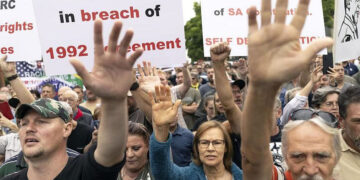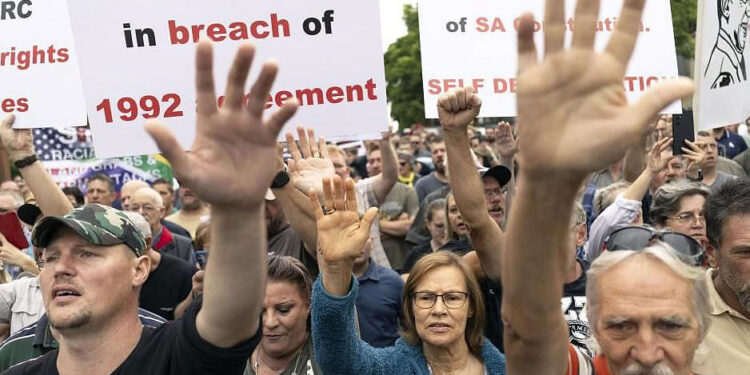A South African court has dismissed allegations of a white genocide in the country, stating they are “clearly imagined” and “not real,” as it blocked a significant financial gift to a far-right group.
The High Court recently overturned a $2.1 million (£1.7 million) donation that Grantland Michael Bray intended to give to the white supremacist organisation Boerelegioen, ruling that the bequest was legally flawed, poorly defined, and went against public policy.
Bray had reportedly planned for the money to support the group’s promotion of racial division and segregation.
This ruling comes amid criticism from US President Donald Trump and his adviser Elon Musk, who have accused South Africa’s government of discriminating against its white population.
Trump has spoken about the “large-scale killing of farmers” in the country, while Musk has called out what he described as “racist ownership laws” and previously warned of a “genocide of white people.”
Despite his tough stance on immigration, Trump has argued that white South African farmers should be granted refugee status in the US due to what he claims is their persecution.
Musk, who spent his early years in South Africa before relocating to the US, has been vocal on the issue.
The legal challenge was brought by Mr Bray’s four siblings, who are also trustees and beneficiaries of the family trust.
They asserted that, in the final decade of his life, their brother became “obsessed with the idea of an impending genocide of white people in South Africa.”
He passed away in March 2022.
Paralysed at 26 due to a military service accident, Mr Bray later became convinced that a so-called “genocide” was imminent.
“That idea was further fuelled by his already present racism and the online content that he was exposed to,” Judge Rosheni Allie wrote in a ruling dated 15 February, which has only recently been made public.
Reports suggest that Mr Bray first encountered members of Boerelegioen in 2020 and provided them with approximately $326,000 (£258,000) in gold coins to support their activities and secure his membership in the group.
Boerelegioen presents itself as a “civil defence movement that enables citizens to resist the promised slaughter of whites in RSA [Republic of South Africa] as well as the theft of their property.”
Later, he added the group as a beneficiary in his will, directing that part of his estate be used to fund its training programmes.
However, with three different entities operating under the Boerelegioen name, the court determined that the intended recipient of Mr Bray’s bequest was unclear.
“The only expression of [Mr Bray’s] intention that is evident is the intention for the funds to be used for ‘training’ as well as [his] own assertions that he wanted the funds used to benefit an organisation which he deemed to be one which ‘will exterminate every black person in South Africa’ and will be used to defend or ward off a white genocide, which is clearly imagined and not real,” Judge Allie said.
Regarding public policy, Mr Bray’s siblings argued that Boerelegioen intended to use the money to “further its messages of racial hatred and separation.”
They also insisted that the organisation “can’t be allowed to undermine the spirit, purport, and objects of the Bill of Rights with impunity and to train a private army with the express purpose of returning to apartheid.”
The Bill of Rights, a cornerstone of South Africa’s Constitution, safeguards civil liberties and was enacted after the collapse of white-minority rule in 1994.
Boerelegioen rejected the accusations, claiming that it provides training and security services to communities without discriminating based on race, gender, or religion.
Judge Allie ruled in favour of the siblings and ordered Boerelegioen to cover the legal expenses of the case.
Earlier this month, Trump signed an executive order halting financial aid to South Africa over new legislation permitting land expropriations under certain conditions.
The plight of white South African farmers has been a key talking point among conservative and far-right groups in the US.
Despite repeated claims of targeted violence against the country’s white Afrikaner minority, official crime statistics tell a different story.
South Africa does not break down crime figures by race, but recent data shows that 6,953 people were murdered between October and December 2024.
Among those killed, 12 died in farm-related attacks. Of these, one was a farmer, five were farm dwellers, and four were farm employees, most of whom were likely black.
By comparison, the same period saw 961 women murdered, along with 273 children.




































